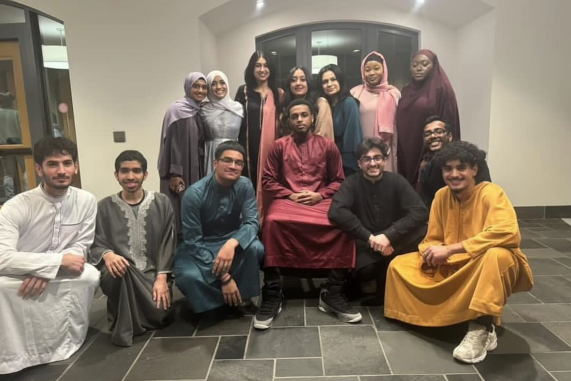
The month of Ramadan is the ninth and holiest month of the Islamic lunar calendar, beginning when the crescent moon is sighted. It is believed that this is the month in which the Quran was first revealed to the Prophet Muhammad, who Muslims believe to be the last and final prophet of God. This year it began on approximately March 11 and is expected to end on April 9 when the new crescent moon is sighted thus commencing the celebration of Eid-al-Fitr.
Ramadan is considered a time for spiritual renewal during which Muslims around the globe gather to pray and fast from dawn to sunset. First-year biology major Nawrah Zamir stated that “We not only abstain from food and drink while fasting, but we must also strive to develop the best character we can.” Zamir and many other students have been observing Ramadan on campus.
The Muslim Student Association (MSA) has provided support for Muslim students during Ramadan by providing halal Iftar meals to break the daily fast and organizing Taraweeh prayers. Third-year international relations major Omar Fallaha stated that “their efforts have helped me feel a strong sense of community, especially after my late classes while fasting.”
The meditation room on the fourth floor of the SUB has provided a needed space for observing students, though since it is available for all students, there are certain standards followed by Muslims which are not upheld by all there, such as removing shoes before entering. Zamir stated that “It would be nice to have a place that we as Muslims can maintain those standards in.” This is especially pertinent because the nearest mosque, or masjid, to New Paltz is nearly a half hour drive away.
Both Zamir and Fallaha note a lack of halal food options on campus, which the only two offered are at Nester’s Grocery. Fallaha, speaking on halal as well as kosher dietary needs, stated that “many students, myself included, face extremely limited or nonexistent dining choices due to this. It’s important that the university addresses this issue so it can ensure inclusivity and respect for all religious dietary requirements.”
Recently a petition has been started by MSA President Taha Malik to compel the university have more dining locations offer halal food. They’re hoping to see changes made to menus as soon as this semester.
Observance of Ramadan also includes an increase in daily prayers, recitation of the Quran, charity and acts of kindness towards others. According to Fallaha, “fasting from sunrise to sunset during this blessed month only scratches the surface of Ramadan’s true beauty.” This sentiment has been especially prominent this year as the world looks on to the events unfolding in the Middle East.
“It is vital that we don’t forget our brothers and sisters around the world, in places such as Palestine, who cannot have a peaceful Ramadan experience — who do not have food to break their fast with and who cannot pray in safe spaces. This month, and every month, we must continue striving for peace and justice for our brothers and sisters who are subject to tyranny and occupation.”
